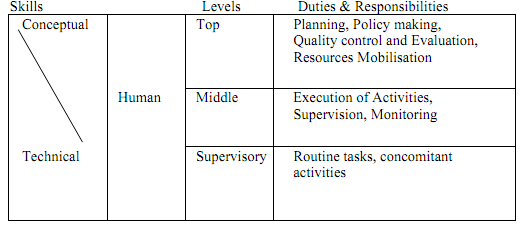LEVELS 0F MANAGEMENT AND MANAGERIAL SKILLS
A manager is anyone, at any level of the organisation, who directs the efforts of other people. He is the catalyst who makes things happen. It may be noted that the management of an organisation is performed at different levels. Although the distinctions are by no means clear it is useful to think of managers as being divided into three groups (or levels):
- Supervisory (or- First line or Operational) Managers are those who directly oversee the efforts of those who actually perform the work. Performance of various routine tasks to obtain desired outputs of every units and concomitant activities is taken care of at this level;
- Middle managers are above the supervisory level but subordinate to the most senior executives of the organisation; they have the responsibility to develop implementation strategies for the concepts determined by top management. Execution, supervision, monitoring and other related functions are taken care of by them;
- Top managers are the most senior executives of the organisation. Top managers are responsible for providing the overall direction of the organisation. They carry out planning, maintenance of relations with other agencies, policy making, standardization, control, evaluation, resources mobilisation, etc.
The importance of these skills depends on levels of management. Technical skill is most important for supervisory level managers and becomes less important as the manager move up to the middle and top levels. Conceptual skill is increasingly important as a managers moves up the levels of management. However, human skills are important at every level in the organisation. It may be noted here that there are other kinds of skills required for managers and they are not discussed here. For example, top and middle managers need to have diagnostic and analytical skills. Diagnostic skill is the ability to acquire, analyse and interpret information to determine the cause of change either in inputs or outputs or in the transformation process. Analytical skill (which is complimentary to' diagnostic skill) is the ability to determine the cause of change and either to provide corrective action or take advantage of the situation.
All functions or elements of management (to be discussed in next section) will be common to all levels of management in some form or the other. However, the duties and responsibilities of the staff operating at different levels will vary. The chart given below indicates how these three levels of management share their duties and responsibilities as well as the skills required for them.
Chart Showing Levels of Management, Their Responsibilities, Duties and Skills

In the above chart, while all the activities are shared by the three levels of management, the proportion of responsibilities, duties and skills with reference to the activities vary. It should be noted, however that the system will work efficiently only if the three levels work in unison. Top management does very little routine operations, while the operational management level staff does not do much planning. But the middle level management is involved in both planning and routine operational work.